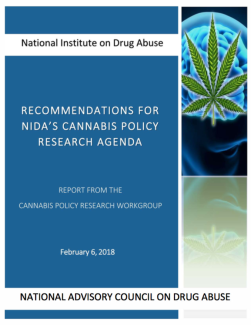Recommendations for NIDA's Cannabis Policy Research Agenda

The National Institute on Drug Abuse (NIDA) has released a new report Recommendations for NIDA's Cannabis Policy Research Agenda.
The document has been prepared by the National Advisory Council on Drug Abuse Workgroup which was formed in 2017. The workgroup comprises members who are experts in pain management, health professionals, substance use disorder experts, and drug policy researchers.
The aims of the workgroup are to support NIDA in developing and progressing scientific understanding of substance use and the issues surrounding it. This is described as being achieved through an inclusive, flexible, and public health oriented approach which is neutral to laws and policies set out in relation to cannabis.
The document explores five key areas: Cannabis Use; Epidemiology; Health and Social Consequences; The Structure, Behavior, and Conduct of the Industry; Prevention and Treatment. The research in these key areas is then presented in 28 recommendations.
Touching on issues such as the creations of standardised units of cannabis consumption, the need for a greater level research on patterns of cannabis use and the instances of cannabis related car-crashes or medical emergencies. The document outlines the need for public health campaigns which focus on driving under the influence, information for parents to speak to their children about cannabis use and responsible use or "low risk guidelines".
The report also calls for better collaboration between federal organisations and institutions such as White House Office of National Drug Control Policy (ONDCP), the Substance Abuse and Mental Health Services Administration (SAMHSA) amongst others; which would allow a more cohesive understanding of the various aspects of cannabis use.
Available in English the report will be useful for anyone interested in key public health messages around cannabis use and anyone who is interested in understanding current research gaps or considerations of an emerging cannabis industry. The recommendations could be used to inspire further research and collaborative work to unpick the key issues mentioned.
